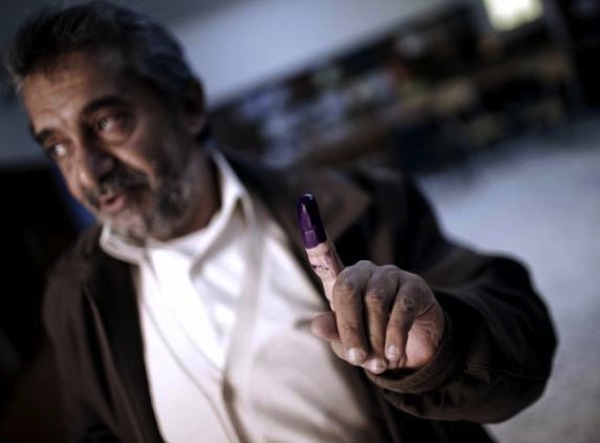
A voter in Misrata, Libya in Feburary 2012. Photo Credit: EFE AP
While much of what is immediately important about a democratic election is whether it was sufficiently free from corruption and interference for voters to decide the outcome, the devil is sometimes in the details. Seemingly minor bureaucratic and logistical concerns can threaten the value of an otherwise legitimate democratic exercise. Even in the United States, where voting is a frequent and relatively high-tech affair, voters have fairly recently encountered issues like polling stations running out of ballots, miscounts, and perhaps most infamously, “hanging chads.”
Two weeks ago, I wrote that it is too soon to speculate about the future of new Arab Spring democracies. That being said, I think that it is important to recognize the incredible progress that these countries have made and are still making in holding free and fair elections. A portion of this success comes from these countries’ abilities to manage the mechanics of election day. Back in October, Tunisia ran a smooth constituent assembly election with 90 percent voter turnout. Foreign Policy’s Erik Churchill observed that the election commission “worked to ensure that voters underst[ood] the role of the constituent assembly (a confusing concept, especially given the ambiguity of its mandate) and the logistics of voting,” explaining these concepts “to both literate and illiterate Tunisians.” Tunisians as far away as Los Angeles even voted in special overseas polling stations.
During the recent presidential elections in Egypt, while some polling stations experienced irregularities and the Carter Center observers had less access than they had asked for, the Center also stated that it “did not observe evidence of major or systemic flaws in the voting and counting process that unfairly advantaged either candidate.” If a whole country voting for president once was not enough of an organizational challenge, Egypt also had to manage a runoff. An emerging consensus suggests that the recent elections were essentially free and fair—a sharp departure from Egypt’s 2005 elections when President Mubarak won with an impossibly high 88.6 percent of the vote.
About last year this time, a New York Times headline declared that “Problems With Logistics, Coordination and Rivalries Hamper Libya’s Rebels.” The accompanying article described rebel casualties and severe arms shortages. Although various forms of violence (and now, a huge surfeit of weapons) persist in Libya, a lot has changed. These days, the “logistics” in international news stories mostly refer to Libya’s slightly delayed elections, postponed by 18 days to July 7 because organizers needed more time to prepare. National elections are a brand new phenomenon for most Libyans. As Reuters notes, “During his 42-year rule, Gaddafi banned direct elections, saying they were bourgeois and anti-democratic. The last time Libya held a multi-party national election was in 1952, under the reign of King Idris.” The city of Misrata’s local election, held in February 2012, demonstrates the kinds of challenges that Libyan election organizers confront. Voter registration was difficult in a city where the last census was taken in 2006. Twenty people registered 100,000 voters. The ballot boxes and purple dye used to mark a voter’s finger to prevent double-voting were brought in from Tunisia. Despite all of this, the Misrata election was ultimately successful (as was another election in Benghazi), and hopefully Libya will be able to say the same for its national election in a week from now.
Of course, even the most logistically sound election does not guarantee a democracy will function well–but its importance is undeniable.